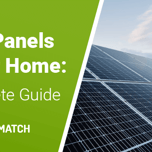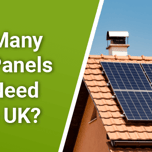Answer these simple questions and we will find you the BEST prices
Which type of solar quotes do you need?
It only takes 30 seconds
100% free with no obligation

Get up to 4 quotes by filling in only 1 quick form

Slash your energy bills by installing solar panels

For the average 2-3 bedroom house
- GreenMatch
- Solar Energy
- Solar Panels
- Commercial Solar Panels
Commercial Solar Panels in the UK: Guide (October 2025)

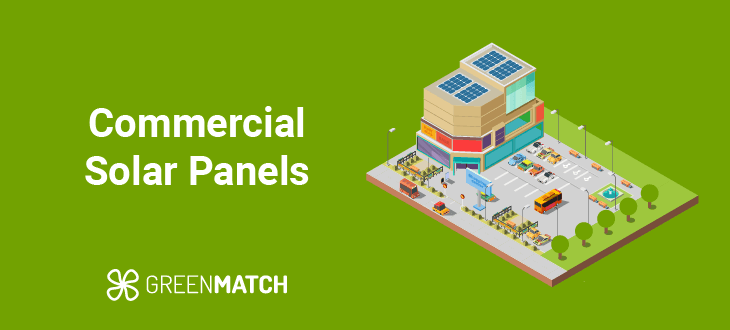
- Commercial solar panels can cost approximately between £16,000 - £60,000 (20kW to 50kW systems) for small to medium-sized businesses.
- On average, commercial solar panels can break even in 4 or 5 years because of a high return on investment (16% - 45%).
- Cost savings and energy independence (off-grid) are among the main benefits of solar panels for businesses.
Commercial solar panels can be beneficial regardless of whether your company is large or small. Most businesses are active during the day, which means they are the perfect candidates for utilising solar panels and enjoying the cost savings that come with them. Let’s see if commercial solar panels are right for you.
Interested in commercial solar panels? We can help you get the best deal! Don’t waste hours contacting installers on your own. Simply fill out our 30-second form, and we’ll do the rest. We’ll connect you with up to 4 trusted solar panel installers near you for free, no-obligation quotes.
Click below to get started.
- Quotes from local engineers
- Payment by finance available
- Save up to £1,567 per year
It only takes 30 seconds



- Commercial Solar Panels in the UK: Guide (October 2025)
- Why use solar panels for businesses?
- How much do commercial solar panels cost?
- Grants for solar panels on commercial buildings
- Savings and break-even point of commercial solar installations
- What are the benefits of commercial solar PV?
- What are the disadvantages of commercial solar installation?
- Do you need planning permission to install commercial solar panels?
- Are commercial solar panels worth it?
- FAQ
Why use solar panels for businesses?
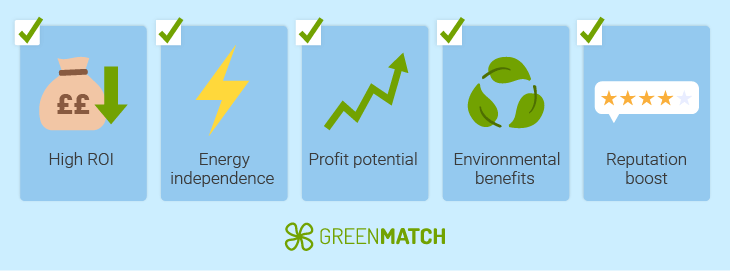
Commercial solar panel installation can bring many benefits, such as high return on investment (ROI) and a reputation boost. This section gives a detailed overview:
- High ROI: Over the 25-year lifetime of solar panels, savings can equate to thousands of pounds. For example, a 20kW system can potentially save businesses over £4,595 annually on their electricity bills. So, if the initial investment is £16,000 - £30,000 for a 20kW system, the ROI would be 15% to 28%.
- Energy independence: Solar panels allow for energy independence and some level of insulation from fluctuating electricity prices. They can also be handy as a backup when there is a power outage, and if you have a solar battery.
- Profit potential: If you operate industrial solar panels, you can sell excess energy to utility companies for a profit through arrangements like Power Purchase Agreements (PPAs) or the Capacity Market.
- Environmental benefits: By switching to commercial solar panels for your business, you will also lower your carbon footprint. Solar panels offset 50g of carbon dioxide for every kilowatt-hour of power they produce.
- Reputation boost: Solar energy is also renewable and carbon-neutral, which could improve your reputation. Switching would indicate your business’s commitment to green and sustainable practices and energy conservation.
How much do commercial solar panels cost?
On average, commercial solar panels cost between £16,000 and £60,000 for small to medium-sized businesses. Several factors influence the cost of solar panels, such as roof size, the amount of energy produced and the number of panels used. A general breakdown of the cost of commercial solar panels can be seen below, excluding VAT.
| System size | Business size | Average cost + installation | Break-even time | ROI(annual) |
|---|---|---|---|---|
| 10kW | Small businesses with basic needs | £13,000 - £15,000 | 5 - 6 years | 16% - 18% |
| 20kW | Medium-sized businesses with specialised equipment | £16,000 - £30,000 | 4 - 5 years | 15% - 28% |
| 50kW | Small-scale commercial businesses needing refrigeration, lighting, and tools | £33,000 - £60,000 | 3 - 6 years | 19% - 36% |
| 60kW | Medium-sized commercial establishments with significant equipment needs | £39,000 - £75,000 | 3 - 5 years | 19% - 36% |
| 80kW | Large commercial and small industrial operations | £50,000 - £100,000 | 3 - 6 years | 24% - 48% |
| 100kW | Large-scale facilities like supermarkets and warehouses | £60,000 - £120,000 | 2 - 5 years | 22% - 45% |
These costs are estimates. Get a local installer QUOTE now!
Most small to medium-sized businesses use 30,000 - 50,000kWh of electricity each year, on average. Monthly, this can be 2,500kWh to 4,167kWh, but this can significantly vary by industry. For example, an office space will have different energy needs than a supermarket.
Depending on where your business is located in the UK, your system size, and the cost per kilowatt (kW), the total costs can vary. You can begin by evaluating the cost to determine if solar panels are a feasible option for your business.
Take a closer look at your utility bill and see how much energy you use each month, along with how much the utility company charges you per kW. If you operate a small business, you could get a price estimate by comparing the installation cost of solar panels and solar battery prices in the UK.
In addition, you may be eligible for tax relief if you have commercial solar panels installed. However, this is not possible for businesses that rely on solar energy for revenue generation, such as solar farms.
Installation, maintenance, and insurance costs
Solar panel system included the panels, inverters (for converting AC to DC), mounting system (for ground or roof), solar batteries (for energy storage), energy management system (monitors metres and controls) and additional components such as bird-proofing.
In the table below, we have used percentages to represent the costs of different components relative to the total cost. Since prices vary depending on system size and energy needs, percentages can give a clear indication of where your investment will go.
| Component | % estimation of total cost |
|---|---|
| Solar panels | 25%-40% |
| Inverters and solar batteries | 10%-20% |
| Mounting/racking | 10%-15% |
| Electrical work | 5%-10% |
| Labour costs | 15%-20% |
| EMS and metres | 5%-10% |
When installing a solar panel system for your business, the main expenses are the panels and inverters. Installation costs may increase for larger systems, especially if additional time or workers are required.
Annual solar panel maintenance costs typically range between £100 and £200, or you can do it yourself for free. Insurance may add £10–£20 per month to your home policy or a one-time specialised solar panel insurance fee of £400–£1,600, depending on the system size and coverage. Integrated monitoring systems can reduce maintenance frequency by enabling easy issue detection.
Grants for solar panels on commercial buildings
While it’s commonplace for homes, can businesses also benefit from solar panel grants and get free solar panels? Currently, the UK does not offer government grants for solar panels on commercial buildings. However, the UK government has applied 0% VAT on goods like solar panels and sustainable technologies, which can save on purchase costs. We've listed this alongside some other government incentives below.
| Grant | Running period | Eligibility | Potential savings |
|---|---|---|---|
| The Smart Export Guarantee (SEG) | Effective from January 2020 onwards | For commercial installations up tp 5MW. Requires a smart meter to measure exported power and MCS certification. | The earning rate in 2025 is roughly 5p to 15p per kWh, depending on your provider. |
| Annual Investment Allowance (AIA tax relief) | Till 31 March 2035 | Businesses that own and invest in solar panels (1 million limit) | Tax relief- to deduct the full cost of qualifying capital expenditure from taxable profits |
| Industrial Energy Transformation Fund (IETF) | Phase 3: 2024–2028 | For large energy-intensive industrial businesses, eligibility varies per phase | Funding supports energy efficiency and decarbonisation projects for industrial processes, including the adoption of solar panels. |
| Local Authority Grants | Varies | It depends on the provider's criteria | Some organisations offer support for solar panel installation to businesses |
Available grants are constantly updated, so staying informed is best. For this reason, we can find up to 4 free quotes from solar experts in your area who can assist you along the way. Avoid the hassle of spending days on research and comparisons on your own. Fill in our 30-second form, and we’ll do the rest.
- Quotes from local engineers
- Payment by finance available
- Save up to £1,567 per year
It only takes 30 seconds



Savings and break-even point of commercial solar installations
Commercial solar panels have the potential to save anywhere from £4,595 to £11,895 annually for small to medium-sized businesses (20kW-50kW).
Below is a breakdown of the potential solar panel savings by system size, which can help you understand the lifetime savings you can expect by opting for commercial solar panels for your business.
| System size | Estimated annual savings | Break-even time |
|---|---|---|
| 10kW | £2,435 | 5 - 6 years |
| 20kW | £4,595 | 4 - 5 years |
| 50kW | £11,895 | 3 - 6 years |
| 60kW | £14,325 | 3 - 5 years |
| 80kW | £24,055 | 3 - 6 years |
| 100kW | £27,030 | 2 - 5 years |
Based on average electricity consumption (kWh) according to Ofgem and estimated electricity generated per year (kWh). These costs are estimates. Get a local installer QUOTE now!
The break-even point becomes lower as the system size increases due to economies of scale. Larger systems produce more energy for less cost per unit, which increases the ROI significantly.
Even though the initial fixed costs are high, the low marginal costs are almost zero after installation due to low running costs. This means that once the system is installed, every additional unit of output produced directly contributes to savings.
What are the benefits of commercial solar PV?
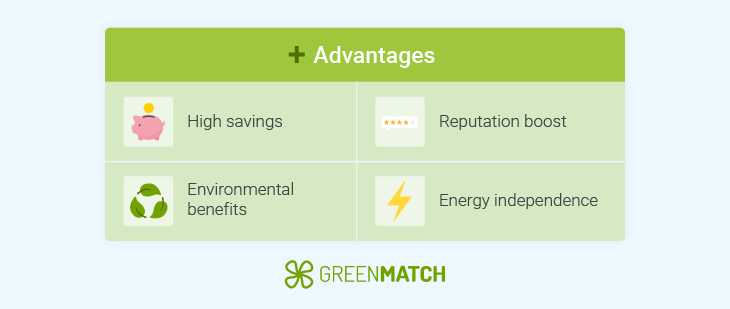
There are many advantages of solar energy, such as cost, efficiency, and income potential. Below, we break down the 3 key advantages of using solar panels for your business.
- High savings: The savings accrued over 25+ years can be significant, not to mention the tax reliefs available for renewable energy expenditure.
- Environmental benefits: Solar energy is renewable and sustainable. The UK’s greenhouse gas emissions have been falling in recent years with the increased use of zero-carbon energy sources like solar.
- Reputation boost: Companies that engage in sustainable energy practices are viewed favourably by consumers. Ditching fossil fuels for solar energy can improve brand image and perception.
- Energy independence: Investing in medium to large-scale solar systems means that you are buying electricity for several years upfront and shielding your business from fluctuating electricity prices.
What are the disadvantages of commercial solar installation?
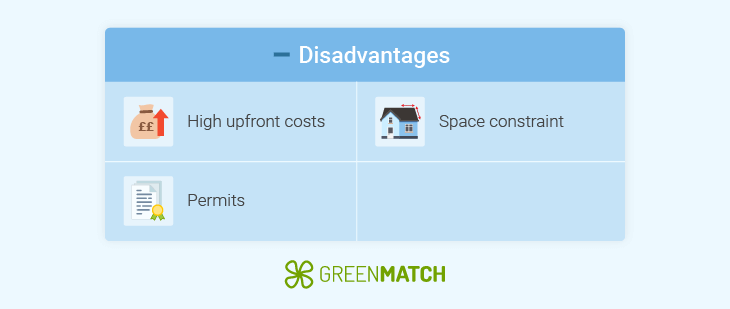
As with most things, commercial solar installation has its disadvantages that are worth keeping in mind.
- High upfront costs: The initial costs can be very high for small businesses. The cost of the panels is only part of the total cost. The inverters, mounting structures, electrical components and installation cost drive up the cost significantly. The payback period for smaller systems is longer than that of larger systems.
- Space constraint: Both ground and roof-mounted commercial solar systems need a large amount of space. This can prove challenging for small enterprises that have limited space.
- Permits: There are planning permissions and building regulations compliance associated with commercial solar panel installation. Availing tax reliefs and utilising SEG have different applications as well. Cutting through red tape can be confusing and time-consuming.
Do you need planning permission to install commercial solar panels?
In some situations, you may need to obtain planning permission for solar panels before installing commercial solar panels. In many cases, the contracting company completing the installation may be willing to sort out these permissions on your behalf.
Always ask before signing any contracts so you know what to expect. Some regions require planning permission to install solar panels on flat roofs. You will need permission if your building or property site is designated as historical or part of a world heritage site.
If you reside in a conservation area and require additional assistance regarding solar panels, we have prepared a comprehensive guide specifically tailored for solar panels in conservation areas.
It’s important to note that while the initial installation may not require permission outside of conservation areas, every subsequent installation or expansion will require approval. This means that if you’re planning to add new panels or expand your existing setup, you’ll need to obtain permission regardless of whether you’re in a conservation area.
If you are in doubt, we highly recommend consulting a professional solar panel installer. There are many qualified installation companies across the UK, but finding the right one can take days of research, calling, or emailing. However, by filling in our 30-second form, you can be connected with up to 4 different vetted installers in no time.
Each installer will be able to help you with several things:
- Identifying if you need planning permission
- Providing you with a competitive quote tailored to your energy demands
- Installing your new solar panel system.
Are commercial solar panels worth it?
In a nutshell, we can easily confirm that commercial solar panels are worth it for business owners in the UK. This can seem surprising since their upfront costs may appear substantial, ranging from £16,000 to £60,000. However, with an ROI of 16% to 45% (depending on system size and energy use) and low maintenance costs, they quickly become cost-effective.
Solar panels also provide energy independence and can mitigate the impact of fluctuating electricity prices, and when paired with a battery, they can serve as a backup during power outages. While the large investment and complex permissions may seem challenging, the long-term financial and environmental benefits make solar panels a valuable investment.
There are two ways to compare solar experts in your area. You can spend hours of your spare time searching for them alone, or you can simply fill out our 30-second form and let us do the hard work for you. We’ll connect you with up to 4 trusted installers in your area. Click below to get started!
- Quotes from local engineers
- Payment by finance available
- Save up to £1,567 per year
It only takes 30 seconds



FAQ
You need to obtain planning permission before installing commercial solar panels.Regardless, it can be worth it due to the many benefits solar panels can bring.
Yes. Solar panels reduce running costs, have a high ROI and reduce reliance on the national grid.
Typically, a 20kW system can be sufficient for the average small business, but this can vary based on numerous factors such as energy needs, budget, local climate and available space.

Anjana has a knack for simplifying complex concepts in an engaging way. She has a background in digital journalism and is committed to delivering impactful content about sustainability and solar energy.


We strive to connect our customers with the right product and supplier. Would you like to be part of GreenMatch?

- Commercial Solar Panels in the UK: Guide (October 2025)
- Why use solar panels for businesses?
- How much do commercial solar panels cost?
- Grants for solar panels on commercial buildings
- Savings and break-even point of commercial solar installations
- What are the benefits of commercial solar PV?
- What are the disadvantages of commercial solar installation?
- Do you need planning permission to install commercial solar panels?
- Are commercial solar panels worth it?
- FAQ
- Quotes from local engineers
- Payment by finance available
- Save up to £1,567 per year
It only takes 30 seconds




